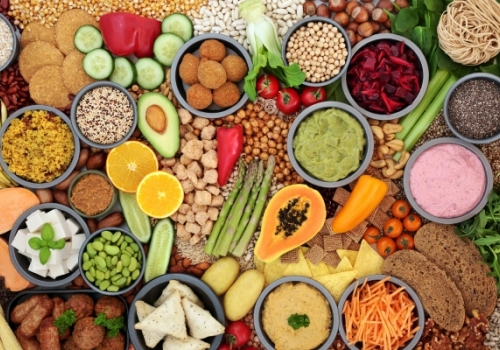Crew Wellbeing: The Case for a Plant-Based Menu

According to the findings of a survey conducted by Quay Crew in 2021 - Mental Health On Board: The State of the Superyacht Sector - over half of superyacht crew say their mental health has deteriorated since working in the sector. So, let's talk about crew wellbeing with intent and purpose, bringing this crucial topic to the forefront where it belongs and offering meaningful and concrete solutions that can be put into action straight away.
As a chef and nutritionist myself, I champion a scientifically proven approach to transform crew wellbeing by helping chefs introduce plant-based menus in manageable steps with tangible results.
Raising mood: Let food be thy medicine
From my extensive research and nutrition training, I believe that embracing plant-based menus can revolutionise crew wellbeing and elevate the entire superyacht experience for crew and guests alike. This is by no means a recent discovery. Throughout history, good food has been recognised for its profound impact on our wellbeing, with scientists continually discovering more about the intricate relationship between diet and health. Perhaps Hippocrates was a trailblazer when he declared: “Let food be thy medicine and medicine be thy food.”
Nutrient-rich foods provide essential vitamins, minerals, and antioxidants that not only support physiological functions but also help prevent chronic diseases. There has been much praise for the Mediterranean diet, extensively studied for its cardiovascular benefits, while the traditional Okinawa diet from Japan has been associated with lower rates of obesity and certain cancers. Research into the gut microbiome has revealed the critical role of dietary fibre and probiotics in maintaining gut health, which in turn influences immune function, metabolic health and mood regulation – the focus of this article.
From ancient healing traditions to modern nutritional science, the understanding of how food enhances wellbeing continues to evolve, emphasising the importance of a diverse and nutrient-rich diet for optimal health.
Emerging studies are highlighting the impact of food on mental wellbeing, with certain nutrients and dietary patterns linked to improved cognitive function and mood stability.
 Doctor Michael Greger, founding member of non-profit Nutritionfacts, Fellow of the American College of Lifestyle Medicine, and author of the bestseller ‘How Not to Die’, highlights a study presented at the American Public Health Association conference. This landmark study reported “The complete restriction of flesh foods significantly reduced mood variability in omnivores… Our results suggest that a vegetarian diet can reduce mood variability in omnivores.” Based on these findings, Dr Greger suggests that “Perhaps eating less meat can help protect mood in omnivores, particularly important in those susceptible to [mood] disorders.” *
Doctor Michael Greger, founding member of non-profit Nutritionfacts, Fellow of the American College of Lifestyle Medicine, and author of the bestseller ‘How Not to Die’, highlights a study presented at the American Public Health Association conference. This landmark study reported “The complete restriction of flesh foods significantly reduced mood variability in omnivores… Our results suggest that a vegetarian diet can reduce mood variability in omnivores.” Based on these findings, Dr Greger suggests that “Perhaps eating less meat can help protect mood in omnivores, particularly important in those susceptible to [mood] disorders.” *
Good gut health is essential for wellbeing
As a seasoned plant-based nutrition coach entrenched in the sailing community, I'm here to cut through the fluff and present the no-nonsense case for adopting a plant-based menu as a game-changer for crew wellbeing.
As previously mentioned, a healthy gut can significantly impact our mood. It’s not by chance that we speak of ‘gut feelings’, which often manifest as physical sensations in our stomach, particularly in times of stress.
Research lead by Sydney E. Martin from Emory University on ‘The Role of Diet on the Gut Microbiome, Mood and Happiness’, revealed that:
“…decreased caloric and total fibre intake increased the gut microbiome's diversity… we discovered a correlation showing that as the gut microbiome becomes more diverse, anxiety and depression decrease.”**
It's important to note that adopting a plant-based diet alone cannot prevent or resolve mental health issues, but supporting your gut microbiome with better dietary choices is a positive step that’s easy to put into action.
Variety is the spice of life
Eating as many as 30 different plants a week can boost the diversity and health of your gut microbiome. Whilst this may sound like a lot, it includes fruits and vegetables as well as grains, nuts, seeds, herbs, and spices.
 Small Vegan Kitchen’s Savvy Tip: Use a variety of leafy greens, nuts and seeds in your salads, prepare multi-fruit and seed smoothies for breakfast, and prepare delicious vegetable curries with a minimum of five vegetables flavoured with herbs and spices. Healthy home-made snacks such as bliss balls and granola bars can easily get you to at least five of those weekly 30 ingredients and reduce the packaging that comes with store-bought treats!
Small Vegan Kitchen’s Savvy Tip: Use a variety of leafy greens, nuts and seeds in your salads, prepare multi-fruit and seed smoothies for breakfast, and prepare delicious vegetable curries with a minimum of five vegetables flavoured with herbs and spices. Healthy home-made snacks such as bliss balls and granola bars can easily get you to at least five of those weekly 30 ingredients and reduce the packaging that comes with store-bought treats!
Not only does this improve gut health, but the abundance of vitamins, minerals, and antioxidants allows yacht crew to operate at peak performance, even in the busiest of seasons and the roughest of seas.
Transitioning to a plant-based diet
In practice, transitioning to a plant-based diet requires some thought and planning. As a plant-based nutrition coach for seafarers and chefs, I break down the steps into manageable actions, and encourage one small initiative every day.
A good place to start is to incorporate a meat-free Monday, or you can join Small Vegan Kitchen’s Wellness Wednesdays program and we’ll guide you in making the switch, helping you set up your galley and answering all your questions about plant-based nutrition, recipe development, provisioning, meal prep, and even how to deal with any resistance to the change.
Increasingly, scientific evidence confirms the importance of improving gut health by eating a whole-food plant-based diet. As well as improving health and enhancing mood, it also leads to a greener galley – a win-win for crew wellbeing and the health of the planet.
If you are feeling inspired and wondering where to start, Small Vegan Kitchen would love to help you take action.
You can contact Sarah Powell Fowler directly via email here.
Founder of Small Vegan Kitchen, Sarah is a sailor, certified coach and plant-based nutrition specialist, assisting chefs to integrate wholefood plant-based nutrition to improve wellbeing, enhance performance, and create a greener galley by implementing more sustainable practices.
References:
**https://www.ncbi.nlm.nih.gov/pmc/articles/PMC10055576/

Post your comment
You cannot post comments until you have logged in.
Login to post a commentComments
No one has commented on this page yet.
RSS feed for comments on this page | RSS feed for all comments